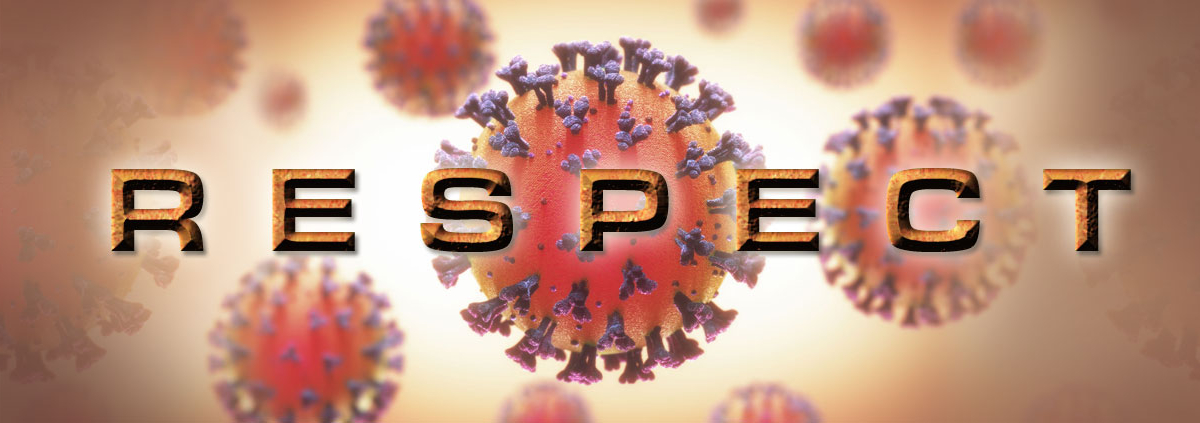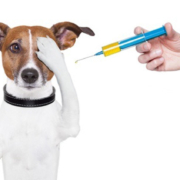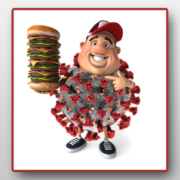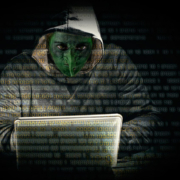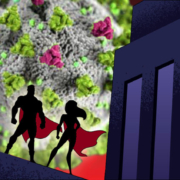Not Fear, Respect!
I’ve read many comments on social media platforms about COVID-19, and the tone remains the same. An ever-growing group of people are talking about theories and conspiracies of all type. “The numbers are rigged to show more deaths from COVID-19 than there really are,” or “Doctors have discovered treatments that work and are being suppressed.” Lately we have this “Plandemic” movie making the rounds. Then there are the people who claim that our liberties are being taken away by being forced to stay home, wear masks, and not work or go to restaurants; they claim we are being forced to be afraid to go into public.
Our perspective on life is governed by the prism we look through. People who fear vaccinations are already saying they will never get a COVID-19 vaccination if there ever is one. People who fear the government are alarmed by the slightest perception of the infringement of their constitutional rights. Almost everyone who understands the disease is afraid of the COVID-19 virus. I want to change your perspective. In doing so, I’ll explain why staying home is a good idea.
In case you’re wondering why my opinion carries any weight, there’s this: in my heart of hearts, I’m a scientist and a teacher. You can check my website bio to learn more, but the important point is that I probably understand science and scientific research better than you do (you undoubtedly know more about your area of expertise than I do). I don’t look at the science news with a political bias, just with a solid education and years of experience that helps me understand what the science really means and what the studies really prove. My mission in life is to share that information with you to help you be healthier, and I can’t think of a time that offer to share has been more important than now.
The Virus: We Just Don’t Know Enough
The virus is the enemy. In order to defeat it, we need to know enough about it to beat it, but we just don’t know enough yet. Here are the most significant questions.
Why do some people catch the virus and don’t have symptoms, yet they can spread it to others very easily? This is the primary question we need answered. Is it that the virus mutates more easily in some people than in others? Is it the total amount of exposure? Is it a genetic factor? The easy ones such as ethnicity, hair color, and eye color haven’t been explored as deeply as they should. Is the microbiome a factor? I could go on and on, but until we know why some people have no symptoms while the virus kills others, we should be prudent in exposing ourselves to it.
Why do some treatments work well in some people and not in others? Case in point is intravenous vitamin C; it helped some people live longer when treated with hydroxychloroquine and the Z-pack while it had no impact on others. We have a partial answer: it worked only in those who were deficient in vitamin C. That also tells us that even people who had enough vitamin C were still susceptible to the virus and died. Not everyone can take the malaria drug hydroxychloroquine because it causes fatal arrhythmias in some people. Until we get a treatment in place that can work for just about everyone if they get the severe form of COVID-19, we should be prudent in being exposed to the virus.
Do we have to wait for a vaccine? No, because there may never be one. While it’s a completely different virus, there’s still no vaccine for HIV some 40 years after its discovery, and it’s possible there may never be a vaccine for this one either. However, scientists seem to be making progress so it looks hopeful, but probably not for 18–36 months.
Testing
Testing is going to have to be part of the solution. Who wants to go to a place of business for an extended visit such as a gym or a haircut or a meal if you don’t know if the people working there have the infection or not? The number of tests required to open the economy and keep it open should create an economy of scale that lowers the cost, and in time the testing should be dependable, precise, and cost effective. The industrial health-manufacturing complex should take on the task of providing these products at the lowest price possible to make it worthwhile for businesses to provide it for employees and customers.
Antibody testing to see if a person had the virus should also be a priority. Antibodies may not create immunity, but they may have some benefit against the virus should a person be exposed again. That’s important to know.
If I had a business where people must show up in person, I’d begin to create the signage “All employees tested daily!” and “We test our customers for free!” That will happen at some point and the sooner the better.
The Bottom Line: Respect
The word “respect” should replace “fear” when talking about COVID-19. People can rant and rave in social media if they want; that’s their right. But if they’re exposed to enough of the virus, they will get it. What happens to them? We can’t predict. We also can’t predict what will happen to their family, their friends, and every person they come in contact with. I can’t imagine anyone who would be willing to put people they care about at risk.
One of the saddest aspects of our time is the stark partisanship and the way it colors everything we see—red versus blue, urban versus rural, white collar versus blue collar. When it shapes the way we see science, it frankly scares me. It’s not a situation where, oops, you might gain a few pounds or vomit for a couple days. This virus could take your life or your parent’s life or your friend’s life; even if you or they survive, you or they may face a lifetime of health challenges such as severely diminished lung function; as an example, a runner may never have the lungpower to run again. And at this point, we know the virus can produce devastating symptoms in a small percentage of children who get it, but we don’t know why and we have no idea what the life-long aftereffects may be; most parents (and grandparents) won’t want to take that gamble.
I don’t want you to be afraid, I just want you to respect the power of the virus and the scientific knowledge we’re slowly gaining.
I’m staying home with the exception of grocery shopping and doctor’s appointments that can’t be done by phone, and I wear a mask when I go out—not to protect myself, but as a courtesy to others. Same for Paula.
We’re not prisoners. The warm weather is finally here, and there’s work to do in the yard. We’re blessed because Paula and I have been working at home for years. We don’t fear catching the virus. We just respect it and understand where we stand at this moment in time.
If you change the prism you look through, respect makes a lot more sense than fear or disbelief. Act accordingly.
What are you prepared to do today?

